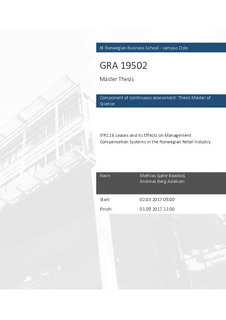IFRS 16 leases and its effects on management compensation systems in the Norwegian retail industry
Master thesis

View/
Date
2017Metadata
Show full item recordCollections
- Master of Science [1621]
Abstract
The background for this master thesis is the upcoming leasing standard issued by
International Accounting Standards Board, IFRS 16 Leases. The standard will
require lessees to recognize substantially all lease arrangements on the balance
sheet. The current standard has been criticized for its binary classification,
allowing lessees to keep certain leased assets off-balance sheet. IFRS 16 will have
an effective date of 1 January 2019, and is deemed to have great impact on
leasing-intensive industries.
We examine how IFRS 16 will impact key ratios for companies applying IFRS,
and consequently whether this will have any possible effects on bonus
compensation contracts for Norwegian retail companies. After we present the
relevant literature regarding lease accounting and management incentives and
bonus contracts, we conduct a case study to analyze IFRS 16’s impact on the
financial statements of two of the largest retail companies in Norway. The results
are used to analyze the effect on identified elements in bonus contracts obtained
from literature and sit-downs with executives of the case companies. This analysis
includes a historical and a forward-looking approach. Succeeding interviews with
auditors enlighten the topics from a professional perspective.
When capitalizing operating leases, we find evidence suggesting a significant rise
in operational measures included in bonus contracts (EBITDA, EBIT, NOPAT),
while included financial measures (ROIC, ROCE, EVA) are likely to decline
notably. However, IFRS 16 appears to have a diminishing effect on growth in
ROIC/EVA when comparing different growth scenarios in a forward-looking
approach. Interviewed experts claim that making bonus contracts more robust can
lead to circumvention of any possible impact from future changes in accounting
policies. To ease the transition, the experts state that acquisition of new ITsystems
and possession of sufficient technical knowledge will be critical for
estimating an accurate present value of all future lease payments.
Description
Masteroppgave(MSc) in Master of Science in Business, Business law, tax and accounting - Handelshøyskolen BI, 2017